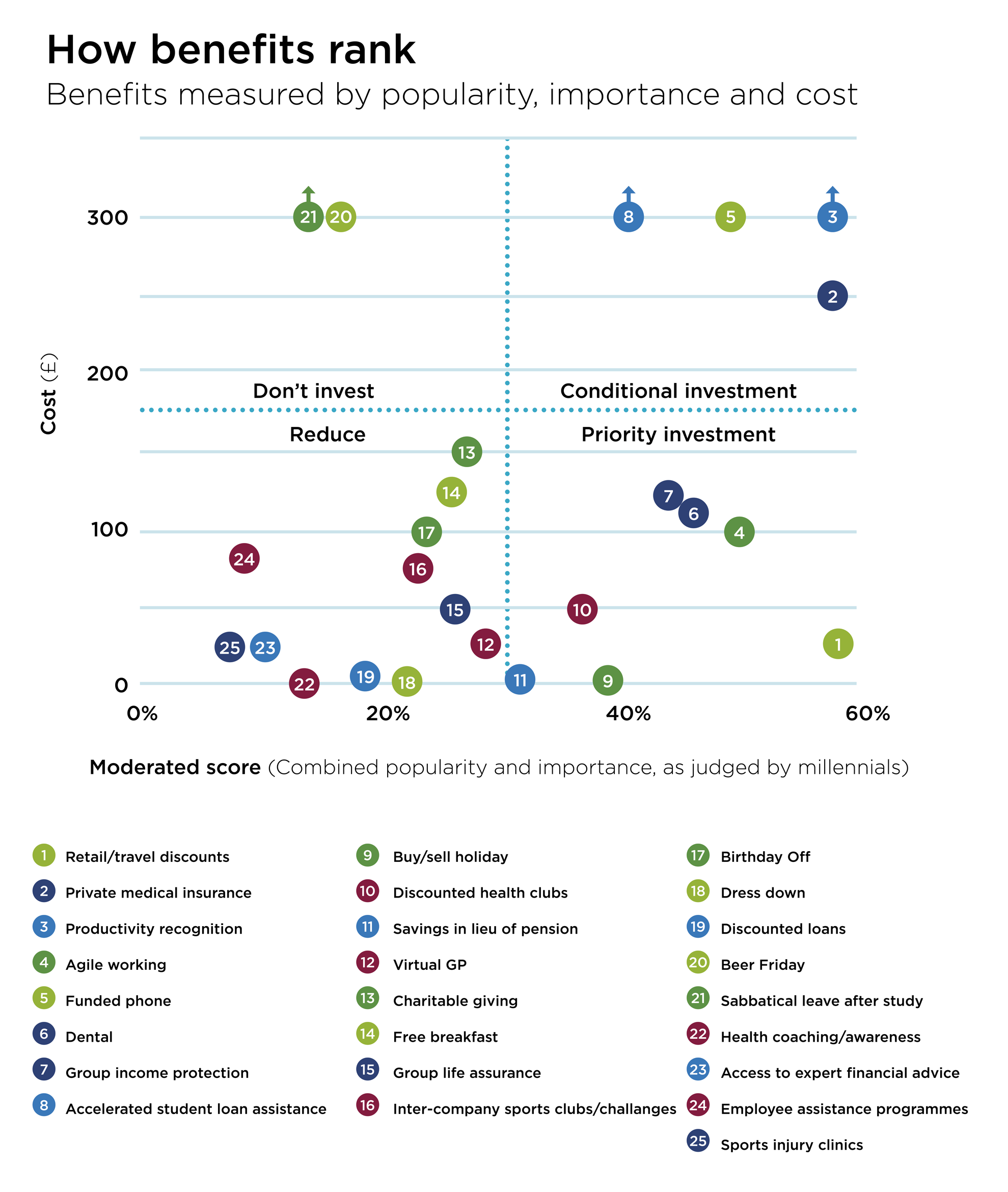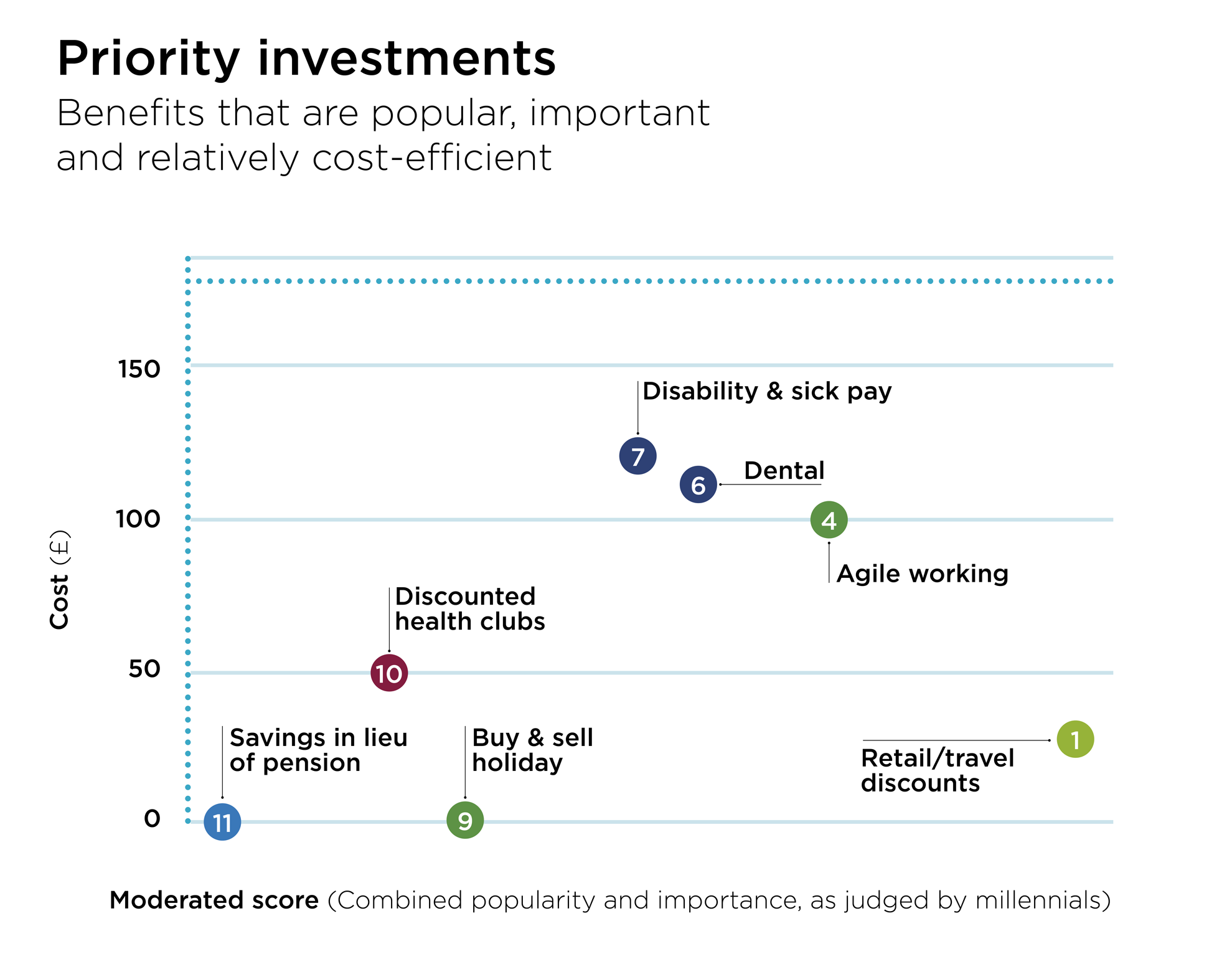Worry less about sabbaticals and dress-down Fridays – companies keen to attract millennials should focus more on career progression and agile working.
Companies’ future success will be heavily influenced by their ability to attract and retain the best young workers.
By 2025 75% of office workers are projected to be millennials (opens a new window), according to one Deloitte survey.
Understanding and providing what millennials (those born between 1977 and 2000) really want from their workplace is therefore vitally important to business success.
70% of millennials consider non-cash benefits important or very important when choosing an employer.
This is not as simple as it might sound, however. Senior managers typically responsible for determining workplace conditions will not necessarily be attuned to younger workers’ social, economic and professional circumstances. This is certainly the inference to be drawn from the fact that many benefits programmes have remained largely unchanged over the past 20 years.
What people want
To better understand what millennials really want from their workplace, we ran a number of tailored focus groups, using paired comparisons (opens a new window), to establish popularity levels of different benefits among graduates and second jobbers, all under 35. (Explanations were provided on the nature of the various benefits to ensure that respondents’ choices were well-informed.)
More than two thirds (70%) of millennials consider non-cash benefits important or very important when choosing an employer, indicates our research.
Our research also indicates that millennials prefer benefits that are focused far more on ‘engagement’ (such as flexible working) rather than benefits focused on support/recovery (such as private medical insurance or group income protection), which have been the focus for most traditional benefits packages.
Working with our pilot groups, we mapped out various benefits according to cost and popularity – gaining an insight into not just what benefits were most attractive to millennials but also most cost-efficient and feasible for employers to implement.

The results fall into four quadrants:
Low cost/high preference – Priority investment
High cost/high preference – Conditional investment
High cost/low preference – Don’t invest
Low cost/low preference – Reduce
Evidently a key focus for employers should be on those benefits that fall into the ‘Priority investment’ quadrant, all of which should be a consideration. Let’s look at these benefits in more detail.

Although not a ‘benefit’ in the tangible sense, the number one factor for millennials when choosing an employer seems to be career progression, our research indicates. A large majority (82%) of millennials said they would choose good career progression prospects over more money.
Agile working and trading holiday also came out really strongly with all focus groups. Agile working can create challenges depending upon business and customer needs, but can potentially reduce real estate costs as well as drive better engagement.
The needs of a 24-year old could be very different from those of a 33-year old junior manager.
Holiday trading is an easier fix, and interestingly it was important to the focus groups that they could both buy and sell holiday (many benefits programmes allow only one-way trading).
What next?
Of course, we should not imagine that these benefits will suit all millennials. Equally, some traditional benefits (such as private medical insurance) will be very important to some younger workers.
Our research indicates that there is a wider dispersion among millennials than among older age groups.
Arguably the millennial category is too broad and encompasses several sub-groups. A more discerning approach should take account of the social, economic and professional circumstances of the population to develop more intelligent benefit solutions. The needs of a 24-year old entry level employee in one organisation, for example, could be very different from those of a 33-year old junior manager in another.
Employers, as always, must be mindful of the potential tension between their responsibilities to provide what they consider most appropriate for their employees, with what employees claim they want. And, of course, a company’s benefits programme should always complement broader business goals.
Join us at our Lockton Breakfast Seminar – 'Engaging the Multigenerational Workforce' – where we will share findings from our research and experience about how employers can effectively address the needs of a multigenerational workforce.
RSVP: locktonbenefits@uk.lockton.com (opens a new window)
2 November 2017, 08:15–10.00
Location: Lockton Companies LLP, The St Botolph Building, 138 Houndsditch, London, EC3A 7AG
For more information, please contact Mike Tyler on:
Tel: +44 (0)20 7933 2773 | Email: Mike.Tyler@uk.lockton.com (opens a new window)


